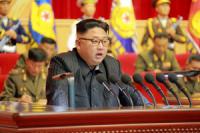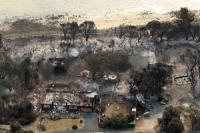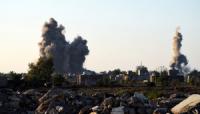-
Experts: Iran advancing nuclear program with help of North Korea
Iran is using its strategic ties to North Korea to advance its illicit nuclear weapons program, experts say. Nuclear and ballistic missile ties between the two nations are longstanding and ongoing, though unlike Iran, North Korea already has developed nuclear weapons. While Iran is temporarily constrained by the nuclear deal, it can contribute to the development of North Korea’s program by sharing its technology and through finance.
-
-
Building privacy right into software code

It is the programmer’s job to enforce these privacy restrictions. Because privacy-related code is scattered throughout all the programs Facebook uses to run its systems, the programmer must be vigilant everywhere. To make sure nobody finds out where I am unless I want them to, the programmer must tell the system to check my privacy settings everywhere it uses my location value, directly or indirectly. The best way to avoid these problems is to take the task of privacy protection away from humans and entrust it to the computers themselves. We can – and should – develop programming models that allow us to more easily incorporate security and privacy into software. Prior research in what is called “language-based information flow” looks at how to automatically check programs to ensure that sloppy programming is not inadvertently violating privacy or other data-protection rules.
-
-
ISIS’s “industrialized” martyrdom resembles Japan’s use of kamikaze pilots: Report

ISIS’s suicide attacks resemble Japan’s use of kamikaze pilots in the Second World War, says a new study which looked at nearly 1,000 ISIS suicide operations in one year. Between December 2015 and November 2016, at least 923 ISIS jihadists killed themselves in suicide attacks according. The report analyzed these ISIS suicide operations and found that 776 of them – or 84 percent – were aimed at military targets, often in an attempt to slow down the advances of opposing ground forces. Winter said ISIS had “industrialized the concept of martyrdom.” Two-thirds of the suicide attacks took place in Iraq, and about 80 percent of the suicide attackers were Iraqi and Syrian.
-
-
Italy pardons ex-CIA operative for 2003 rendition in Rome
Sabrina de Sousa, a former CIA officer who faced the prospect of becoming the first intelligence official to be sent to prison for being involved in rendition of terrorists as part of President George W Bush’s War on Terror, has been granted a last-minute pardon by Italy. De Sousa was convicted in absentia in 2009 for taking part in the rendition of a radical Egyptian cleric known as Abu Omar. Abu Omar is to be extradited by Egypt to Italy this week to serve a four-year sentence there.
-
-
Jewish cemetery vandalized in Philadelphia, JCCs hit with fifth wave of bomb threats
There have been 89 bomb threats made against 72 Jewish community centers and day schools in 30 U.S. states and Canada since the start of 2017. Over 52 percent of all anti-religious hate crimes in the U.S. were directed at Jewish targets in 2015, the latest year for which FBI statistics are available.
-
-
Turkey completes half of its Syrian border wall
Turkey has completed more than half of a planned 317-mile wall along its border with Syria. The wall is not built as a regular wall would: It consists of portable concrete blocks, each weighing seven tons, placed next to each other. The concrete blocks are 6.5-foot thick at the base and 10-foot high. Each block is topped with three feet of razor wire. The government says the wall will improve security, but human rights groups warn refugees fleeing war will be tapped on the Syrian side.
-
-
Large dose of VX killed Kim Jong-nam in 15-20 minutes

Kim Jong-nam, the half-brother of North Korea’s leader, was attacked with a large doze of VX which caused his death within 15-20 minutes after being poisoned by a nerve agent at Kuala Lumpur airport, the Malaysian health minister, S. Subramaniam, said on Sunday. Some experts have suggested that the two women who attacked him might have each smeared Kim’s face with two different non-lethal elements of VX, which became deadly when mixed on his face.
-
-
Why the time is right to set up an international terrorism court

The global toll of terrorism is rising at an alarming rate. According to the Institute for Economics and Peace, terrorist incidents claimed 3,329 lives in 2000 but 32,685 in 2014, and the economic costs of terrorism skyrocketed at least tenfold during the same period. As a result, certain governments are proposing that the UN establish a new court with a specific remit to prosecute international terrorist crimes. The court, I sablished, would join the growing ranks of international courts and tribunals that have been rapidly proliferating since the end of the Cold War. Of the more than 37,000 legally binding judgements passed by these international courts, some 90 percent have come down since 1990.The problems and risks of creating such a court are all too apparent, and go some way to explaining why the court has never been set up.
-
-
Recovery lessons from Hurricane Sandy to help improve resilience, disaster preparedness

Purdue University will lead a $2.5 million, four-year research to determine why some communities recover from natural disasters more quickly than others, an effort aimed at addressing the nation’s critical need for more resilient infrastructure and to enhance preparedness. The research team will apply advanced simulations and game-theory algorithms, access millions of social media posts and survey data collected along the New Jersey shore, which was devastated by Hurricane Sandy in 2012.
-
-
Kim Jong-nam killed by VX nerve agent: Malaysian police
Malaysian police have said the substance used in the killing of Kim Jong-nam was a VX nerve agent. North Korea, which is not a member of the Chemical Weapons Convention (CWC), is in possession of a large stockpiles of chemical weapons — between 2,500 and 5,000 metric tons, with Sarin and VX making up the bulk of the arsenal. Experts say that the public nature of the killing, and the assailants’ disregard for the safety of bystanders, is comparable to the assassination in London of former Russian intelligence officer Alexander Litvinenko. Litvinenko, who became a fierce critic of Vladimir Putin, was killed on Putin’s orders by two agents of the FSB in London in November 2006. The agents placed small quantities of radioactive poison, polonium-210, in his tea.
-
-
Tech coalition fights DHS proposal to collect social media passwords
Earlier this week, the Center for Democracy & Technology announced the creation of a coalition of tech companies, NGOs, and privacy advocates to oppose efforts by DHS to collect social media passwords from individuals entering the United States. The coalition focuses on visa applicants who might be compelled to share their passwords under new DHS policies.
-
-
Threats of violent Islamist and far-right extremism: What does the research say?
The 9/11 attacks were perpetrated by Islamist extremists, resulting in nearly 18 times more deaths than America’s second most devastating terrorist attack – the Oklahoma City bombing. More than any other terrorist event in U.S. history, 9/11 drives Americans’ perspectives on who and what ideologies are associated with violent extremism. But focusing solely on Islamist extremism when investigating, researching and developing counterterrorism policies goes against what the numbers tell us. Far-right extremism also poses a significant threat to the lives and well-being of Americans. This risk is often ignored or underestimated because of the devastating impact of the 9/11 terrorist attacks.It remains imperative to support policies, programs, and research aimed at countering all forms of violent extremism.
-
-
Supreme Court considering case of Mexican boy killed by Border Patrol agent shooting across border
The Supreme Court appears to be evenly divided about the question of whether the Mexican parents of a teenager who was shot dead by a Border Patrol officer could use American courts to sue the Border Patrol agent who fired across the U.S.-Mexican border and killed their son. Lower courts dismissed the parents’ lawsuit – but the Supreme Court has taken up the case in order to determine whether non-citizens who are injured or killed outside the United States — by actions of an American from inside the United States — can pursue their case in American courts.
-
-
Assault weapons not protected by Second Amendment: U.S. appeals court

The U.S. Court of Appeals for the Fourth circuit ruled 10-4 to uphold Maryland’s ban on assault weapons, ruling that assault weapons are not protected under the Second Amendment of the U.S. Constitution. “Put simply, we have no power to extend Second Amendment protection to the weapons of war,” Judge Robert King wrote. “Both before and after Newtown, similar military-style rifles and detachable magazines have been used to perpetrate mass shootings in places whose names have become synonymous with the slaughters that occurred there,” he wrote.
-
-
Loss of territory contributes to significant drop in ISIS funding

Islamic State’s income has more than halved since 2014, due to its shrinking territory in Syria and Iraq and subsequent losses of significant sources of revenue, according to a new study. Whilst it is impossible to say exactly how much money Islamic State has at its disposal, findings show that the most significant sources of revenue are closely tied to the territory it controls. Most recent evidence suggests that total income from taxes/extortion, oil, kidnapping, antiquities, looting, and confiscations has decreased from up to $2 billion in 2014 to less than $800 million in 2016. There is also no evidence that the group has been successful in creating new sources of revenue.
-
More headlines
The long view
Factories First: Winning the Drone War Before It Starts
Wars are won by factories before they are won on the battlefield,Martin C. Feldmann writes, noting that the United States lacks the manufacturing depth for the coming drone age. Rectifying this situation “will take far more than procurement tweaks,” Feldmann writes. “It demands a national-level, wartime-scale industrial mobilization.”
No Nation Is an Island: The Dangers of Modern U.S. Isolationism
The resurgence of isolationist sentiment in American politics is understandable but misguided. While the desire to refocus on domestic renewal is justified, retreating from the world will not bring the security, prosperity, or sovereignty that its proponents promise. On the contrary, it invites instability, diminishes U.S. influence, and erodes the democratic order the U.S. helped forge.
Fragmented by Design: USAID’s Dismantling and the Future of American Foreign Aid
The Trump administration launched an aggressive restructuring of U.S. foreign aid, effectively dismantling the United States Agency for International Development (USAID). The humanitarian and geopolitical fallout of the demise of USAID includes shuttered clinics, destroyed food aid, and China’s growing influence in the global south. This new era of American soft power will determine how, and whether, the U.S. continues to lead in global development.
Water Wars: A Historic Agreement Between Mexico and US Is Ramping Up Border Tension
As climate change drives rising temperatures and changes in rainfall, Mexico and the US are in the middle of a conflict over water, putting an additional strain on their relationship. Partly due to constant droughts, Mexico has struggled to maintain its water deliveries for much of the last 25 years, deliveries to which it is obligated by a 1944 water-sharing agreement between the two countries.
How Disastrous Was the Trump-Putin Meeting?
In Alaska, Trump got played by Putin. Therefore, Steven Pifer writes, the European leaders and Zelensky have to “diplomatically offer suggestions to walk Trump back from a position that he does not appear to understand would be bad for Ukraine, bad for Europe, and bad for American interests. And they have to do so without setting off an explosion that could disrupt U.S.-Ukrainian and U.S.-European relations—all to the delight of Putin and the Kremlin.”
How Male Grievance Fuels Radicalization and Extremist Violence
Social extremism is evolving in reach and form. While traditional racial supremacy ideologies remain, contemporary movements are now often fueled by something more personal and emotionally resonant: male grievance.
